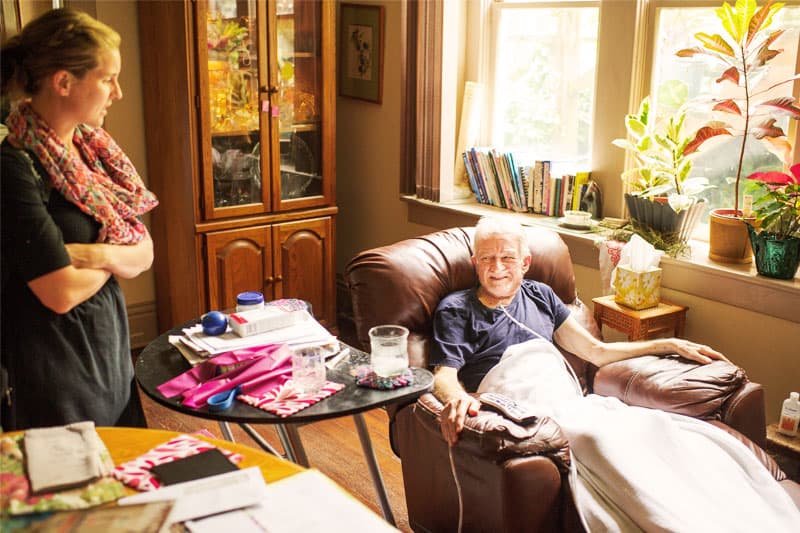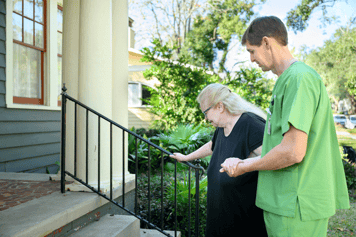For families who are responsible for caring for a loved one with dementia at home, determining the best way to provide necessary medical care can be challenging. Sometimes, individuals living with dementia struggle with changes in routine and environment or may even face mobility issues, making travel for care difficult.
If you are considering home health care for a loved one with dementia, this article will help you explore the available services and find out whether Medicare provides coverage.
Home health agencies like Amedisys help individuals living with dementia by combining a comprehensive assessment of their health with a team approach to care.
Understanding Medicare and Dementia Care
Dementia is a general loss of mental abilities, including thinking, reasoning, learning and understanding, that is severe enough to interfere with day-to-day activities and eventually will impact movement and ability to care for themselves.
The most common cause of dementia is Alzheimer’s disease, in as many as 80 percent of cases. 1 It’s a slowly progressing form of dementia that eventually leads to severe impairment.
Another 10 percent of dementia is caused by vascular dementia, relating to strokes or other issues with blood flow to the brain. Some patients may also have Lewy body disease, characterized by a build-up of abnormal protein deposits, or Lewy bodies, in the brain.
-1.jpg?width=701&height=467&name=Website%20Photos%20(9)-1.jpg)
Unfortunately, there is no cure for dementia. The goal of treating patients with dementia is to delay the disease from worsening and to manage ongoing symptoms with lifestyle changes and medications.
Medicare Coverage for Dementia Care
Medicare can cover the following for dementia care:
Cognitive Assessments
As part of Medicare Part B (medical insurance), patients can receive cognitive assessments to look for possible signs of dementia and confirm any diagnoses as part of annual wellness visits. 2
This benefit also includes a separate visit with the same doctor or a specialist to review the results of the assessment and, if necessary, develop a plan of care to treat any symptoms or diagnoses appropriately.
Depression Screenings
Those in the early stages of a mental health disorder diagnosis may suffer from depression. Medicare Part B also covers one depression screening per year in a primary care setting. 3
Prescription Drugs
While traditional Medicare does not cover prescription drugs comprehensively, those with Medicare Part D plans cover many prescriptions dependent on specific rules. 4
The most common types of medication for dementia patients include cholinesterase inhibitors and N-methyl-D-aspartate (NMDA) receptor antagonists. Some patients may also need antidepressants, anti-anxiety agents, mood stabilizers or antipsychotics.
.jpg?width=729&height=410&name=Blog%20Graphic%20Callouts%20(11).jpg)
Home Health Care
Original Medicare also covers home health care for patients who meet specific eligibility criteria. This includes having a doctor's order for home health services, being considered "homebound," and needing intermittent skilled nursing care or physical, speech, or occupational therapy.
Depending on the severity of dementia, some patients may also qualify for behavioral health home care.
How Home Health Care Supports Patients with Dementia
Home health care promotes independence, increases safety, comfort and convenience for patients, provides relief for family caregivers, prevents unnecessary visits to the hospital and provides personalized care. Dementia patients specifically have the following benefits:
Access to a Full Interdisciplinary Team
Home health care can help dementia patients by educating them and their caregivers on how to best manage their disease at home. Specifically, home health teams will:
- Educate caregivers on patients’ specific forms of dementia
- Promote medication adherence
- Minimize potential fall or general safety risks from the home
- Provide nutrition and exercise tips
- Help build a support system through caregivers
- Help plan for the future
As with all home health care, our teams will encourage the patient to describe their goals of managing their condition. These goals may include living independently, avoiding hospitalizations, staying physically active, and engaging in activities that support mental stimulation.
Home health aides will support activities of daily living and serve as eyes and ears to the rest of the clinical team, reporting any changes of conditions or symptoms. Medical social workers provide behavioral health education, psychosocial assessments and can point to financial assistance and community resources.
Physical therapists support patients in developing exercise regimens that improve mental health while occupational therapists implement healthy routines and coping strategies to manage symptoms and medication adherence.
Speech therapists help manage language and communication disorders that often occur alongside dementia. Specifically, they can help with patients who experience aphasia, or difficulty expressing and understanding language. Speech therapists devise activities and exercises to improve language skills while working with the patient and caregiver on alternative communication methods, including everything from simple picture books to advanced augmentative and alternative communication (AAC) devices.
.jpg?width=644&height=429&name=Website%20Photos%20(20).jpg)
Caregiver Empowerment
Caregiver empowerment is also vital. Home health teams can help with stress coping techniques and healthy lifestyle habits.
Home Safety
Home safety is especially important for those with dementia. Home health teams will help patients and their caregivers assess their abilities, behaviors and overall health to determine what steps need to be taken.
Just about every room in the house should be inspected for potential safety risks. In the bathroom, grab bars and non-skid mats can go a long way in preventing falls. Unplugging or installing safety knobs on the microwave or stove in the kitchen may be necessary for some, while the refrigerator should be checked regularly for expired food.
Generally, the home should have minimal clutter and decorative objects, sufficient lighting, marked glass doors or windows and working locks on all windows and outside doors.
Diet and Nutrition
As dementia progresses, some patients may experience a loss of appetite, decreased sense of taste and/or smell and difficulty or inability to chew and/or swallow. They may also simply forget to eat.
Speech therapists can assist with difficulties like difficulty chewing or swallowing (called dysphagia). They assess risks and teach safe eating techniques to prevent aspiration and malnutrition. They may recommend texture modifications or alternative feeding methods. Other members of the care team may offer practical mealtime tips, such as limiting distractions, simplifying the eating area, using cups with lids, and serving finger foods.
Psychiatric Nursing to Support Patients with Dementia
Some Amedisys locations provide behavioral health or mental health services through a psychiatric nurse. This type of care is specialized in-home care for those with mental health disorders. Eligible patients may include those with:
- Depression, anxiety, schizophrenia, bipolar disorder, PTSD or dementia with behaviors and other behavioral health conditions
- Progressive and chronic illnesses such as Parkinson’s disease, heart failure, multiple sclerosis (MS) or chronic obstructive pulmonary disease (COPD), with depression or anxiety complicating treatment
- A newly diagnosed terminal or chronic condition with co-morbid depression, anxiety or grief
- Chronic pain complicated by depression
- Difficulty managing a medical condition because of underlying depression, anxiety or other psychiatric illness
- Unresolved grief and depression related to the death of a loved one
- Dementia with hallucinations, delusions, agitation or combative behavior, including teaching caregivers how to manage behaviors and care for their loved one
- Hallucinations, delusions or recent psychotropic medication changes related to schizophrenia
To receive this type of specialized at-home care, patients must meet the criteria for homebound status related to their psychiatric diagnosis as well as a medical condition.
Psychiatric nurses have special training and serve as educators, advocates and consultants. They work with patients and their caregivers and doctors to create personalized plans of care.
Each visit includes a psychiatric evaluation and head-to-toe physical assessments. Psychiatric nurses use standard rating scales to assess and measure outcomes and progress on goals. For some patients, they may also administer psychotropic injections and obtain labs.
Ready to Take the Next Step?
Once you've confirmed that your loved one qualifies for home health care, it's important to carefully consider which agency will best meet their needs. Since 1982, Amedisys has proudly provided high-quality, Medicare-certified home health care. To learn how our services can support your loved one living with dementia, fill out the contact form below or call our nearest care center today.
TeRonna Hall, BSN, RN, CCP, serves as a Clinical Content Development Specialist at Amedisys. With 36 years of healthcare experience, including 34 years in home health, she is dedicated to educating others on health-related topics.
References |





